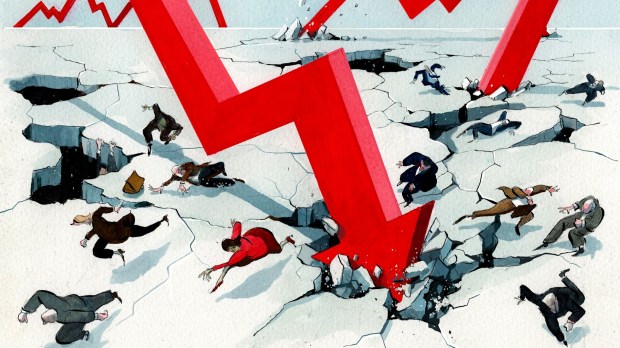The Prime Minister’s heralded ‘industrial strategy’ was robbed of headlines by the story of the misguided Trident missile. But it was perhaps as well that the 132-page green paper — with its ‘ten pillars’ of platitude about ‘delivering affordable energy and clean growth’, ‘improving procurement’ and all the rest — garnered so little attention, because even the business voices who were waiting to welcome it were quick to spot it as no more than a wordy discussion draft, bereft of substantive ideas.
Nevertheless, as Mrs May says, to have an industrial strategy at all represents ‘a new approach to government, not just stepping back and leaving business to get on with the job, but stepping up to a new, active role…’ This column certainly agrees with the objective of making the UK ‘one of the most competitive places in the world to start or to grow a business’, for example. But how? What the Guardian calls ‘turbo-libertarians’ will respond that tax breaks and deregulation are the only surefire way to nurture and keep a critical mass of competitive industries, especially in the post-Brexit mêlée.
The risk inherent in the paper is that targeted initiatives to encourage enterprise will become confused with political objectives of ‘sharing the benefits’ more widely, including shifting prosperity from London to the rest of the country — creating more muddles and loopholes while doing nothing measurable for the overarching aim of improving national productivity. What would I do instead? Focus on the first three of the ten pillars, which fall unequivocally within the state remit: ‘investing in science, research and innovation’ by refocusing university spending; ‘developing skills’ by making teachers teach maths, basic literacy and science properly; and ‘upgrading infrastructure’ to give us world-class connectivity. The rest, I fear, is largely waffle.
Falling hero
Latest news on the £670 million Rolls-Royce bribery scandal to which I alluded last week is that the aero-engine maker’s former chief executive, Sir John Rose, has hired Stephen Pollard, a lawyer who once defended Barings’ rogue trader Nick Leeson. The company itself cut plea bargains to avoid prosecutions that might have led to exclusion from government contracts, but the Serious Fraud Office is evidently still talking to individual executives — including Rose, who was running the business at the time when many of the alleged incidents of bribery took place in Brazil, Indonesia, Thailand and elsewhere.
In his 15 years at the top, Rose presided over a tripling of Rolls-Royce revenues and bolstered the company’s position as a global competitor. When he stood down in 2011 I called him ‘the outstanding British industrialist of his generation’ and proposed him for a ministerial job (in charge of skills) with a peerage. Another newspaper placed him in the top ten of Britain’s most admired business leaders of the past 50 years. Tenacious, tight-lipped, physically tough, this son of a colonial civil servant seemed to belong to an earlier era of big business, driven more by grit than by PR, personality cult and short-term performance. Talking to the SFO implies no more than that he was there at the time and that he ought to have known what was going on in his company. But no one should relish seeing this former corporate hero stumble or fall.
Time to go quietly
A boardroom big shot of a different stripe was Bernie Ecclestone, who has finally been forced out as the boss of Formula 1 by its new owner Liberty Media, fiefdom of the US billionaire John Malone. In a combative and controversial reign of almost 40 years, Ecclestone turned F1 from a niche sport to a global money machine for himself and his co-investors, and generally got the better of critics and adversaries. He survived everything hostile fate could throw at him, including bypass surgery, a billion-pound tax bill, a billion-dollar divorce and a biography by Tom Bower. In 2014 he paid £60 million to a German court to settle a bribery charge (the banker to whom he had allegedly paid $45 million having already been jailed for receiving it) but later called himself ‘an idiot’ for settling rather than fighting. He even faced down persistent rumours that he might have had something to do with the Great Train Robbery, joking in 2005 that ‘there wasn’t enough money on that train’.
On his promotion to ‘chairman emeritus’ of F1 this week — to make way for former News Corp president Chase Carey as chief executive — Bernie declared sourly that he had been ‘deposed’. But at 86, maybe it’s time to go quietly at last.
America’s dream deferred
President Trump’s inaugural rant prompted me to reread Let America Be America Again by the black poet Langston Hughes, who is said to have been an inspiration to Martin Luther King. Writing in 1936, Hughes spoke for the immigrant and ‘the poor white, fooled and pushed apart’ as well as his own people, ‘the Negro bearing slavery’s scars’: together, the millions of Americans ‘who never got ahead’ and have nothing for their efforts ‘except the dream that’s almost dead’. The poem is the authentic cry of the economically disappointed who feel themselves exploited by ‘that ancient chain of profit, power, gain’. It ends with a rallying call: ‘Out of … the rot of graft, and stealth, and lies,/ We the people must … make America again!’
But that’s not what came to pass, Trump supporters argue, which is why 63 million voters bought his snake oil of nativism, jingoism, anti-establishment bile and fake empathy with the ‘poor white’ whose experience he has never shared. I’m guessing the new president isn’t a big Langston Hughes fan, but before he makes any more angry, unfulfillable promises, he should read the same poet’s Harlem, from 1951: ‘What happens to a dream deferred?/… Does it stink like rotten meat?…/ Or does it explode?’
Got something to add? Join the discussion and comment below.
Get 10 issues for just $10
Subscribe to The Spectator Australia today for the next 10 magazine issues, plus full online access, for just $10.















Comments
Don't miss out
Join the conversation with other Spectator Australia readers. Subscribe to leave a comment.
SUBSCRIBEAlready a subscriber? Log in